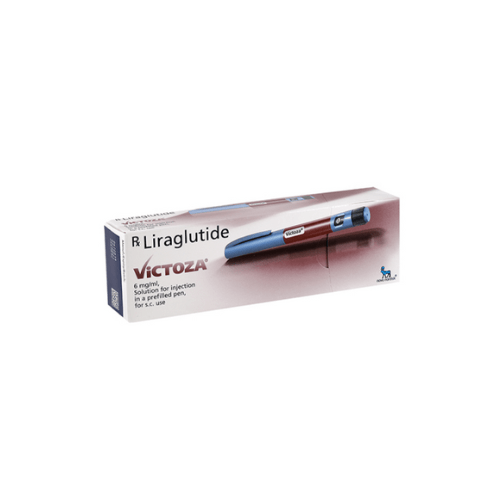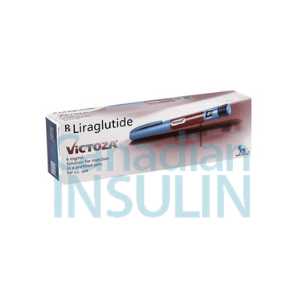Please note: a valid prescription is required for all prescription medication.
Victoza (liraglutide) is an injectable medication used to treat type 2 diabetes by improving blood sugar control. It also helps with weight loss and reduces the risk of cardiovascular events in people with type 2 diabetes. The Victoza Pen provides a convenient way to administer the medication with a once-daily subcutaneous injection.
Benefits:
- Helps lower blood sugar levels in adults with type 2 diabetes
- Reduces the risk of heart attack, stroke, and cardiovascular death in people with type 2 diabetes
- Assists in weight loss by reducing appetite
- Convenient, once-daily injectable pen
- Improves HbA1c levels when used as part of a comprehensive diabetes management plan
Dosage:
- The typical starting dose is 0.6 mg once daily for the first week to help reduce gastrointestinal side effects.
- After 1 week, increase the dose to 1.2 mg once daily.
- If additional blood sugar control is needed, the dose may be increased to 1.8 mg once daily.
Warnings and Precautions:
- Victoza may increase the risk of thyroid C-cell tumors and is contraindicated in those with a family or personal history of medullary thyroid carcinoma (MTC).
- It can cause pancreatitis. Discontinue if severe abdominal pain occurs.
- Risk of low blood sugar is higher when used with other diabetes medications like insulin or sulfonylureas.
- Use with caution in patients with kidney issues; monitor kidney function regularly.
- Victoza can cause nausea, vomiting, and dehydration, especially at the start of treatment.
- Not recommended during pregnancy; discontinue if pregnancy occurs.
Usage Instructions:
- Inject Victoza once daily, at the same time each day
- It can be taken with or without food
- Inject subcutaneously (under the skin) into the thigh, abdomen, or upper arm
- Rotate injection sites to avoid irritation
- Follow the instructions provided with the pen for proper dosage and injection technique
Storage Information:
- Store the Victoza Pen in the refrigerator at 36°F to 46°F (2°C to 8°C)
- After the first use, the pen can be kept at room temperature (up to 86°F or 30°C) for up to 30 days
- Do not freeze the medication
- Keep the pen tightly closed and out of reach of children
Common Side Effects:
- Nausea is a common side effect, particularly during the initial stages of treatment.
- Diarrhea may occur in some individuals.
- Vomiting can also be experienced, especially when first using the medication.
- Abdominal pain is another possible side effect.
- Decreased appetite is commonly reported by users.
- Constipation may also occur during treatment with Victoza.
More information about Victoza
Express Shipping - from $25.00
Shipping with this method takes 3-5 days
Prices:
- Dry-Packed Products $25.00
- Cold-Packed Products $35.00
Standard Shipping - $15.00
Shipping with this method takes 5-10 days
Prices:
- Dry-Packed Products $15.00
- Not available for Cold-Packed products
How does Victoza differ from other GLP-1 medications?
How does Victoza differ from other GLP-1 medications?
Unlike other GLP-1 medications, Victoza offers flexible, once-daily dosing with a pen that makes it easy for patients to use. It’s also been shown to not only improve blood sugar control but also aid in weight loss and reduce cardiovascular risks, offering a comprehensive approach to managing type 2 diabetes.Can I use the Victoza Pen if I have other health conditions?
Can I use the Victoza Pen if I have other health conditions?
Victoza can be used by many individuals with type 2 diabetes, but if you have a history of thyroid cancer, pancreatitis, or kidney issues, it’s important to discuss these conditions with your healthcare provider first. Your doctor will help determine whether Victoza is suitable for your specific health needs.How does Victoza impact my risk of heart disease?
How does Victoza impact my risk of heart disease?
Victoza has been proven to lower the risk of heart attack, stroke, and cardiovascular-related death in individuals with type 2 diabetes. Its ability to improve blood sugar control and reduce inflammation makes it a vital tool for managing heart health in people with diabetes.What should I do if I miss a dose of Victoza?
What should I do if I miss a dose of Victoza?
If you miss a dose of Victoza, take it as soon as you remember, as long as it’s within 12 hours of your scheduled dose. If more than 12 hours have passed, skip the missed dose and take your next dose at the regular time. Never take two doses at once to make up for a missed dose.Can Victoza help prevent complications related to diabetes?
Can Victoza help prevent complications related to diabetes?
Yes, Victoza not only helps manage blood sugar but also plays a key role in preventing common diabetes complications like nerve damage, kidney disease, and heart issues. By improving glycemic control and reducing cardiovascular risk, it can help protect long-term health.
Rewards Program
Earn points on birthdays, product orders, reviews, friend referrals, and more! Enjoy your medication at unparalleled discounts while reaping rewards for every step you take with us.
You can read more about rewards here.
POINT VALUE
How to earn points
- 1Create an account and start earning.
- 2Earn points every time you shop or perform certain actions.
- 3Redeem points for exclusive discounts.
You Might Also Like
Related Articles
Soliqua Solostar Pen – One Pen, Dual-Action Support
Managing type 2 diabetes can be a complicated journey, especially when your current treatment plan isn’t helping you meet your blood sugar goals. That’s where the Soliqua Solostar Pen comes…
How SGLT2 Inhibitors Are Changing Heart Failure Care
Heart failure is a long-term health condition impacting millions worldwide. It occurs when the heart can’t pump blood efficiently, resulting in symptoms like fatigue, breathlessness, and swelling. Traditionally, treatment has…
Basaglar Cartridge: Long-Acting Insulin for Diabetes
Managing diabetes requires consistent attention, especially when it comes to regulating blood sugar levels. Among the tools used in long-term diabetes care is long-acting insulin, and one notable option is…
Xultophy® Prefilled Pen: Insulin + GLP-1 for Diabetes Care
Managing type 2 diabetes is often a balancing act that involves careful monitoring, lifestyle adjustments, and effective medication. For many patients, finding a treatment that delivers strong blood sugar control…




